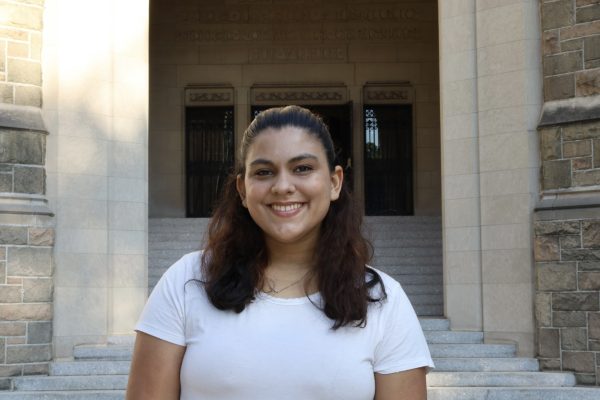Fordham’s Department of Jewish Studies Hosts Three-Part Series
On Monday, Jan. 24, the Fordham University Department of Jewish Studies held the first part of a three-part Distinguished Lecturer Series. The lecture was entitled “Separation Anxieties: Jews, Judaism and the Creation of Christianity: The Great Man Theory” and given by Professor Adele Reinhartz.
Reinhartz is a professor of classics and religious studies at the University of Ottawa. She has written nine books, including “Befriending the Beloved Discipline” and, most recently, “Cast out of the Convent: Jews and Anti-Judaism in the Gospel of John.” Reinhartz has received numerous honors for her work. Two of these honors include induction into the Royal Society of Canada in 2005 and into the American Academy for Jewish Research in 2014.
The lecture discussed “the process by which Christians came to view themselves as separate from and even against Jews remains one the ‘hot’ topics among historians and theologians of the Christian movement.” Reinhartz started the lecture by explaining two main points she wished to express. The first is a most simplistic statement regarding how scholars have defined Christian origins as a separation of Christianity and Judaism.
The second point, the fact that discussing Jews and Christians is a source of anxiety among historians addressing early Christianity, leads to future discussion.
Reinhartz included a recap of the history she was speaking of analyzing in her lecture. She reminded the audience that Christianity began with a group of Galilean Jews who believed fellow Jewish person, Jesus, to be the Son of God and their Messiah. As the group grew, they began to separate from other Jewish people, forming their own practices, scriptures and beliefs, and eventually they began referring to themselves as Christians.
Reinhartz discussed that anxiety stems from this part of history. The way in which Christianity’s origin is intertwined with Judaism has created a tension surrounding this section of Christian history. There are scholars who believe that upon the arrival of Jesus, the Christians replaced the Jews as God’s chosen people. This idea leads to the belief that Christian gospel condemns Judaism, therefore creating a divide where Christians view themselves as above Jewish people.
Reinhartz raises the question of whether the break of Christianity away from Judaism is a result of their feelings of superiority or if post-split Christians felt their gospel earned them superiority. Reinhartz does not claim to know but states that she has her suspicions. She delves into a discussion of the assumptions and hypocrisy that make up the basis of justification used for Judaism inferiority. She said that modern people tend to take ancient text out of context and twist it to support antisemitic beliefs.
The big concept that Reinhartz’s lecture addresses is what is referred to as the Great Man Theory. Under the lens of this theory, Reinhartz presented her analysis of the early Christian writing validity. The Great Man Theory consists of multiple great men, Jesus only being one of them. This has caused critique of the Great Man Theory surrounding who the founder of Christianity was. The theory is imperfect, being very patriarchal and biased in nature.
The lecture concluded with the combination of Great Man Theory and the separation anxiety. Reinhartz states that the variety approaches to why Christian origins always result from the Jewish matrix and the Jesus movement originated from the debate over who the “Great Man” in the Great Man Theory is. These debates and tensions make it so that even though theologians acknowledge Jesus’ Jewish identity, there is still an alienation and narrative of superiority over Jewish people. Christians feel no obligation towards Jewish people nor do they feel a need to apologize or make amends for the hatred.
Other theories of Christian origins as well as messages and impacts on Judaism and Jewish history will be further discussed in the next parts of Reinhartz’s lecture. The next parts of the lecture, focusing on the Natural Succession Theory will take place on Feb. 2, with a third part about Conflict Theory planned for Thursday, Feb. 9.
Adele Reinhartz’s lectures are among numerous events being held by the Center for Jewish Studies this spring. Later this week, on Thursday, Jan. 26, there will be a discussion panel in observance of Holocaust
Remembrance Day. The panel will take place at 5:30 p.m. in McNally Amphitheater at Lincoln Center. The list of other events coming up throughout the rest of the semester can be found on the Fordham Center for Jewish Studies website. Additionally, anyone interested can sign up to receive their newsletter and be kept up to date on Jewish Studies events and news.

Julianna Morales is a senior from Pittsford, N.Y., majoring in psychology with a double minor in English and disability studies. Julianna joined the Ram...







































































































































































































